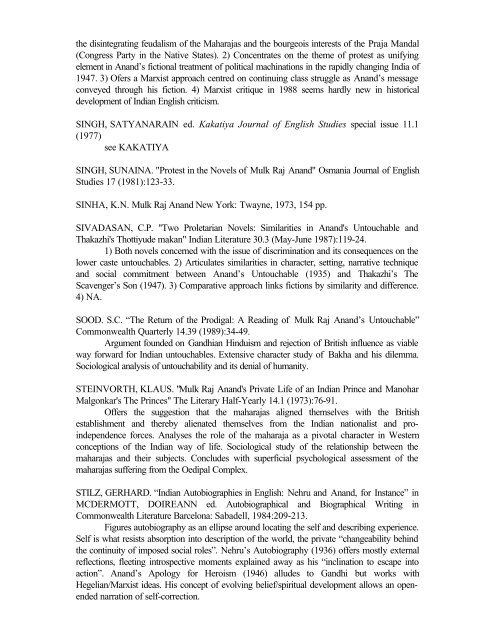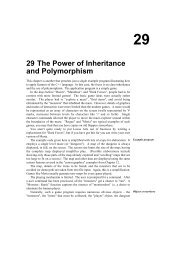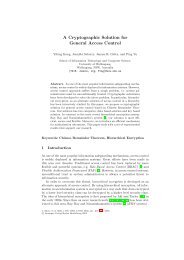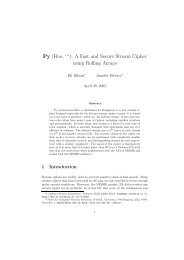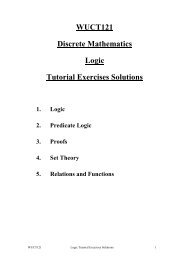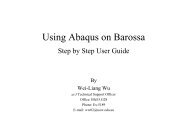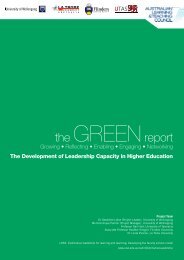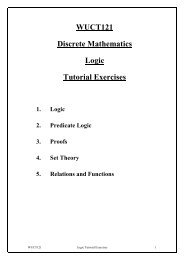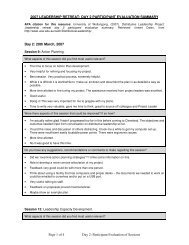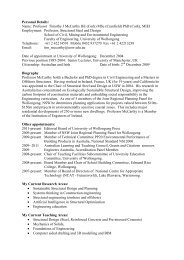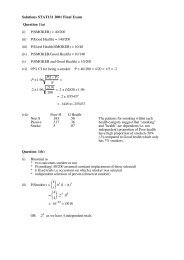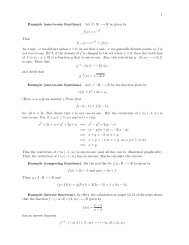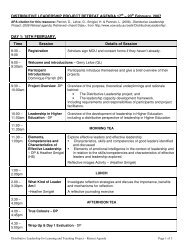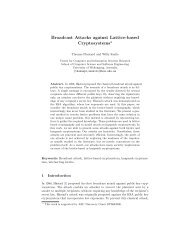india author m 1- a-nan - University of Wollongong
india author m 1- a-nan - University of Wollongong
india author m 1- a-nan - University of Wollongong
Create successful ePaper yourself
Turn your PDF publications into a flip-book with our unique Google optimized e-Paper software.
the disintegrating feudalism <strong>of</strong> the Maharajas and the bourgeois interests <strong>of</strong> the Praja Mandal<br />
(Congress Party in the Native States). 2) Concentrates on the theme <strong>of</strong> protest as unifying<br />
element in A<strong>nan</strong>d’s fictional treatment <strong>of</strong> political machinations in the rapidly changing India <strong>of</strong><br />
1947. 3) Ofers a Marxist approach centred on continuing class struggle as A<strong>nan</strong>d’s message<br />
conveyed through his fiction. 4) Marxist critique in 1988 seems hardly new in historical<br />
development <strong>of</strong> Indian English criticism.<br />
SINGH, SATYANARAIN ed. Kakatiya Journal <strong>of</strong> English Studies special issue 11.1<br />
(1977)<br />
see KAKATIYA<br />
SINGH, SUNAINA. "Protest in the Novels <strong>of</strong> Mulk Raj A<strong>nan</strong>d" Osmania Journal <strong>of</strong> English<br />
Studies 17 (1981):123-33.<br />
SINHA, K.N. Mulk Raj A<strong>nan</strong>d New York: Twayne, 1973, 154 pp.<br />
SIVADASAN, C.P. "Two Proletarian Novels: Similarities in A<strong>nan</strong>d's Untouchable and<br />
Thakazhi's Thottiyude makan" Indian Literature 30.3 (May-June 1987):119-24.<br />
1) Both novels concerned with the issue <strong>of</strong> discrimination and its consequences on the<br />
lower caste untouchables. 2) Articulates similarities in character, setting, narrative technique<br />
and social commitment between A<strong>nan</strong>d’s Untouchable (1935) and Thakazhi’s The<br />
Scavenger’s Son (1947). 3) Comparative approach links fictions by similarity and difference.<br />
4) NA.<br />
SOOD. S.C. “The Return <strong>of</strong> the Prodigal: A Reading <strong>of</strong> Mulk Raj A<strong>nan</strong>d’s Untouchable”<br />
Commonwealth Quarterly 14.39 (1989):34-49.<br />
Argument founded on Gandhian Hinduism and rejection <strong>of</strong> British influence as viable<br />
way forward for Indian untouchables. Extensive character study <strong>of</strong> Bakha and his dilemma.<br />
Sociological analysis <strong>of</strong> untouchability and its denial <strong>of</strong> humanity.<br />
STEINVORTH, KLAUS. "Mulk Raj A<strong>nan</strong>d's Private Life <strong>of</strong> an Indian Prince and Manohar<br />
Malgonkar's The Princes" The Literary Half-Yearly 14.1 (1973):76-91.<br />
Offers the suggestion that the maharajas aligned themselves with the British<br />
establishment and thereby alienated themselves from the Indian nationalist and proindependence<br />
forces. Analyses the role <strong>of</strong> the maharaja as a pivotal character in Western<br />
conceptions <strong>of</strong> the Indian way <strong>of</strong> life. Sociological study <strong>of</strong> the relationship between the<br />
maharajas and their subjects. Concludes with superficial psychological assessment <strong>of</strong> the<br />
maharajas suffering from the Oedipal Complex.<br />
STILZ, GERHARD. “Indian Autobiographies in English: Nehru and A<strong>nan</strong>d, for Instance” in<br />
MCDERMOTT, DOIREANN ed. Autobiographical and Biographical Writing in<br />
Commonwealth Literature Barcelona: Sabadell, 1984:209-213.<br />
Figures autobiography as an ellipse around locating the self and describing experience.<br />
Self is what resists absorption into description <strong>of</strong> the world, the private “changeability behind<br />
the continuity <strong>of</strong> imposed social roles”. Nehru’s Autobiography (1936) <strong>of</strong>fers mostly external<br />
reflections, fleeting introspective moments explained away as his “inclination to escape into<br />
action”. A<strong>nan</strong>d’s Apology for Heroism (1946) alludes to Gandhi but works with<br />
Hegelian/Marxist ideas. His concept <strong>of</strong> evolving belief/spiritual development allows an openended<br />
narration <strong>of</strong> self-correction.


